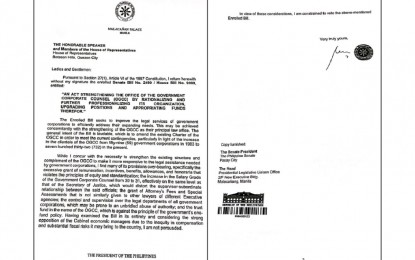
MANILA – President Ferdinand “Bongbong” Marcos Jr. on Friday vetoed Senate Bill 2490 and its counterpart, House of Representatives Bill 9088 titled “An Act Strengthening the Office of the Government Corporate Counsel (OGCC) by Rationalizing and Further Professionalizing Its Organization, Upgrading Positions and Appropriating Funds Therefor.”
In a news release on Saturday, Press Secretary Trixie Cruz-Angeles explained that one of the reasons cited by the President for the veto was “the excessive remuneration to be given the OGCC lawyers.”
“The other reasons for the veto were the possible violation of the One Trust Fund policy of government, the grant of supervision and control over legal departments of government corporations, as well as the distortion of the relationship with the Secretary of Justice,” Cruz-Angeles added.
This is the second time in less than a month that the President has vetoed a proposed law under his young presidency.
To recall, Marcos earlier vetoed a bill that sought to establish a special economic zone in San Miguel Corp.'s Bulacan Airport City, noting its "substantial fiscal risks."
He pointed out that the proposed law, which was seen to provide alternative areas for investment outside Metro Manila, infringes on other agencies' mandates and narrows the tax base with the incentives to be given to businesses in the special economic zone.
As the head of the government's executive branch, the President of the Philippines is granted under the 1987 Constitution, the power to veto measures that he or she objects to.
"Every bill passed by the Congress shall, before it becomes a law, be presented to the President. If he approves the same, he shall sign it; otherwise, he shall veto it," Section 27 of the 1987 Constitution states.
The President may enter his or her objections to an enrolled bill in two ways: by vetoing the entire bill or only certain lines or portions of the measure.
Under the same 1987 Constitution, a vetoed bill should be returned to the chamber of Congress where it originated for reconsideration and appropriate action within 30 days.
If two-thirds of the members of the originating chamber agree to pass the bill, the vetoed measure will be sent to the other chamber for its reconsideration.
If it gets the approval of two-thirds of all members of the other chamber, the bill then becomes a law. (OPS)
